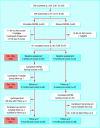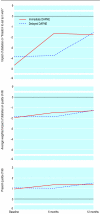Training in flexible, intensive insulin management to enable dietary freedom in people with type 1 diabetes: dose adjustment for normal eating (DAFNE) randomised controlled trial
- PMID: 12364302
- PMCID: PMC128375
- DOI: 10.1136/bmj.325.7367.746
Training in flexible, intensive insulin management to enable dietary freedom in people with type 1 diabetes: dose adjustment for normal eating (DAFNE) randomised controlled trial
Abstract
Objectives: To evaluate whether a course teaching flexible intensive insulin treatment combining dietary freedom and insulin adjustment can improve both glycaemic control and quality of life in type 1 diabetes.
Design: Randomised design with participants either attending training immediately (immediate DAFNE) or acting as waiting list controls and attending "delayed DAFNE" training 6 months later.
Setting: Secondary care diabetes clinics in three English health districts.
Participants: 169 adults with type 1 diabetes and moderate or poor glycaemic control.
Main outcome measures: Glycated haemoglobin (HbA(1c)), severe hypoglycaemia, impact of diabetes on quality of life (ADDQoL).
Results: At 6 months, HbA(1c) was significantly better in immediate DAFNE patients (mean 8.4%) than in delayed DAFNE patients (9.4%) (t=6.1, P<0.0001). The impact of diabetes on dietary freedom was significantly improved in immediate DAFNE patients compared with delayed DAFNE patients (t=-5.4, P<0.0001), as was the impact of diabetes on overall quality of life (t=2.9, P<0.01). General wellbeing and treatment satisfaction were also significantly improved, but severe hypoglycaemia, weight, and lipids remained unchanged. Improvements in "present quality of life" did not reach significance at 6 months but were significant by 1 year.
Conclusion: Skills training promoting dietary freedom improved quality of life and glycaemic control in people with type 1 diabetes without worsening severe hypoglycaemia or cardiovascular risk. This approach has the potential to enable more people to adopt intensive insulin treatment and is worthy of further investigation.
Figures



Comment in
-
Training in flexible intensive insulin management improved glycemic control and quality of life in type 1 diabetes.ACP J Club. 2003 May-Jun;138(3):68. ACP J Club. 2003. PMID: 12725623 No abstract available.
-
Training in flexible intensive insulin management improved glycaemic control and quality of life in type 1 diabetes.Evid Based Nurs. 2003 Jul;6(3):77. doi: 10.1136/ebn.6.3.77. Evid Based Nurs. 2003. PMID: 12882190 No abstract available.
Similar articles
-
Long-term biomedical and psychosocial outcomes following DAFNE (Dose Adjustment For Normal Eating) structured education to promote intensive insulin therapy in adults with sub-optimally controlled Type 1 diabetes.Diabetes Res Clin Pract. 2010 Jul;89(1):22-9. doi: 10.1016/j.diabres.2010.03.017. Epub 2010 Apr 18. Diabetes Res Clin Pract. 2010. PMID: 20399523 Clinical Trial.
-
Training in flexible, intensive insulin management to enable dietary freedom in people with Type 1 diabetes: dose adjustment for normal eating (DAFNE) randomized controlled trial.Diabet Med. 2003 Jun;20 Suppl 3:4-5. doi: 10.1034/j.1600-6143.2003.000987_3.x. Diabet Med. 2003. PMID: 12786669 Clinical Trial. No abstract available.
-
Dose adjustment for normal eating (DAFNE) - an audit of outcomes in Australia.Med J Aust. 2010 Jun 7;192(11):637-40. doi: 10.5694/j.1326-5377.2010.tb03662.x. Med J Aust. 2010. PMID: 20528716
-
Improving management of type 1 diabetes in the UK: the Dose Adjustment For Normal Eating (DAFNE) programme as a research test-bed. A mixed-method analysis of the barriers to and facilitators of successful diabetes self-management, a health economic analysis, a cluster randomised controlled trial of different models of delivery of an educational intervention and the potential of insulin pumps and additional educator input to improve outcomes.Southampton (UK): NIHR Journals Library; 2014 Dec. Southampton (UK): NIHR Journals Library; 2014 Dec. PMID: 25642502 Free Books & Documents. Review.
-
Repaglinide : a pharmacoeconomic review of its use in type 2 diabetes mellitus.Pharmacoeconomics. 2004;22(6):389-411. doi: 10.2165/00019053-200422060-00005. Pharmacoeconomics. 2004. PMID: 15099124 Review.
Cited by
-
Comparing the Effectiveness of Different Dietary Educational Approaches for Carbohydrate Counting on Glycemic Control in Adults with Type 1 Diabetes: Findings from the DIET-CARB Study, a Randomized Controlled Trial.Nutrients. 2024 Oct 31;16(21):3745. doi: 10.3390/nu16213745. Nutrients. 2024. PMID: 39519579 Free PMC article. Clinical Trial.
-
Mapping the evolution and impact of ketogenic diet research on diabetes management: a comprehensive bibliometric analysis from 2005 to 2024.Front Nutr. 2024 Oct 15;11:1485642. doi: 10.3389/fnut.2024.1485642. eCollection 2024. Front Nutr. 2024. PMID: 39483785 Free PMC article.
-
The Relation of Diabetes Complications to a New Interpretation of Glycaemic Variability from Continuous Glucose Monitoring in People with Type 1 Diabetes.Diabetes Ther. 2024 Dec;15(12):2489-2498. doi: 10.1007/s13300-024-01648-w. Epub 2024 Oct 23. Diabetes Ther. 2024. PMID: 39443335 Free PMC article.
-
Long-Term Glycemic Control Improvement After the Home and Self-Care Program for Patients With Type 1 Diabetes: Real-World-Based Cohort Study.J Med Internet Res. 2024 Sep 11;26:e60023. doi: 10.2196/60023. J Med Internet Res. 2024. PMID: 39259960 Free PMC article.
-
2023 Clinical Practice Guidelines for Diabetes Management in Korea: Full Version Recommendation of the Korean Diabetes Association.Diabetes Metab J. 2024 Jul;48(4):546-708. doi: 10.4093/dmj.2024.0249. Epub 2024 Jul 26. Diabetes Metab J. 2024. PMID: 39091005 Free PMC article. No abstract available.
References
-
- Audit Commission. Testing times: a review of diabetes services in England and Wales. London: Audit Commission; 2000.
-
- The Diabetes Control and Complications Trial Research Group. The effect of intensive treatment of diabetes on the development and progression of long-term complications in insulin-dependent diabetes mellitus. N Engl J Med. 1993;329:683–689. - PubMed
-
- Bradley C, Todd C, Gorton T, Symonds E, Martin A, Plowright R. The development of an individualized questionnaire measure of perceived impact of diabetes on quality of life: the ADDQoL. Qual Life Res. 1999;8:79–91. - PubMed
-
- Bradley C, Speight J. Patient perceptions of diabetes and diabetes therapy: assessing quality of life. Diabetes Metab Res Rev (in press). - PubMed
Publication types
MeSH terms
Substances
LinkOut - more resources
Full Text Sources
Other Literature Sources
Medical
Miscellaneous
